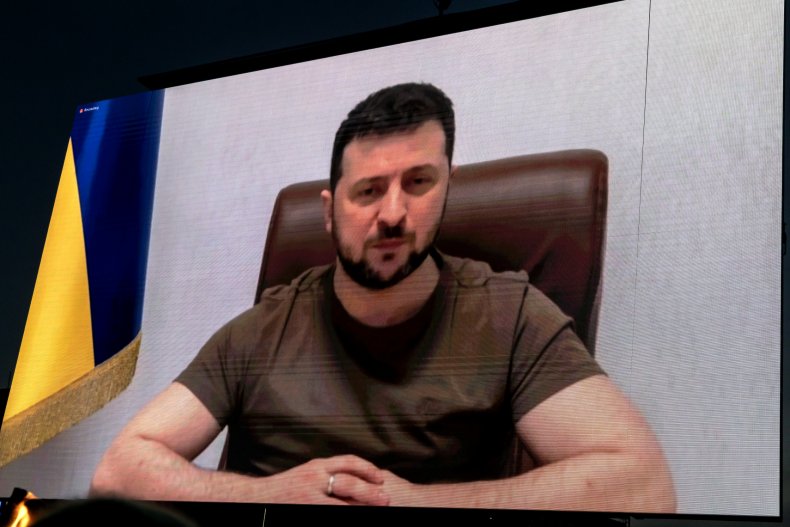MARK DAVIS
You can feel it in the reduced appetite for hourly updates on troop movements. You can see it in emerging doubts about the heavy sums of American money cobbled together on the fly, with little scrutiny. And you can sense it in a growing mood that we are in for a long struggle of uncertain result.
These are the early stages of Ukraine fatigue, and it has ramifications for America, Europe and the world. Our once-rapt attention to Russia's invasion now feels more like a passing daily interest, as news reports continue to offer images of the latest Putin atrocity or the most recent act of spirited Ukrainian resistance.
It's not that we have lost our overall wish for Putin to be thwarted in his designs to absorb Ukraine back into Mother Russia; but as the weeks pass, as inspiring as the Ukrainian resistance has been, more Americans are starting to wonder about the cost and duration of our involvement.
This should be a proper environment for principled debate, but that's been made difficult by hot takes from both sides seeking to insult opponents. Skeptics slam Ukraine aid supporters as "endless war"-supporting neocons or opportunistic Democratic hawks looking to give Joe Biden one issue on which he might be able to claim success. Meanwhile, casting doubt or even asking questions about expensive American immersions into this crisis can draw accusations of siding with Putin.
This is not helpful. Questioning current and future billions of taxpayer dollars earmarked for Ukraine does not make one a Russian propagandist. Conversely, maintaining support for U.S. involvement does not necessarily constitute approval of spending without end.
But where does it end? It's a fair question, and there is no clear answer. It is a genuine surprise that Russia has been often frustrated in its aims since the late February invasion. The world clearly underestimated the fighting spirit of the Ukrainian people, and overestimated the competence of the modern Russian military. Americans know a thing or two about the ability of a scrappy country to ward off a superpower. After a cost of 58,000 lives and $1 trillion (in adjusted 2022 dollars), Vietnam is still a communist country today. Russian history includes the Soviet Union's own decade of quagmire in Afghanistan. On paper, that might have looked like a decisive win for the dominant nation.
 To commemorate Danish World War II Liberation Day, Danes traditionally place candles by their windows, this year Ukrainian President Zelensky addresses Danes via video projected on large screens at Copenhagen City Hall Square.OLE JENSEN/GETTY IMAGES
To commemorate Danish World War II Liberation Day, Danes traditionally place candles by their windows, this year Ukrainian President Zelensky addresses Danes via video projected on large screens at Copenhagen City Hall Square.OLE JENSEN/GETTY IMAGESBut wars are not fought on paper. While we are rooting for the far larger nation to be repelled in the Ukrainian conflict, that result is not guaranteed. Two other possibilities exist: Russia regaining its mojo and steamrolling Ukraine this year, or a stalemate extending well into the remainder of this decade.
Both are daunting prospects. An outright Russian win, even if it winds up taking far longer than expected, would be a proxy loss for the United States. Would we be able to merely shrug that off and say, "Hey, we tried?" Would history interpret that as an inevitable Ukrainian loss despite help from allies, or would it be an American black eye that would damage our global credibility?
Part of the effort to stoke support for U.S. aid has been invoking the rhetoric of moral necessity. Senate Minority Leader Mitch McConnell (R-KY) told reporters, "I think we all agree the most important thing going on in the world right now is the war in Ukraine." The response was swift from critics wondering if the Ukrainian border crisis is actually more pressing than our own border crisis—or if China might still be a far bigger deal, or if there might be a list of other American needs more deserving of billions in deficit spending.
It is the money that has been a key battleground for the debate over American devotion to the Ukrainian cause. Loudest among the 57 House Republicans voting against the $40 billion aid package was Rep. Chip Roy (R-TX), who was none too pleased at the bill's sudden arrival and hidden expenditures: "Why don't we actually have a debate on the floor of the People's House instead of the garbage of a $40 billion bill at 3 o'clock in the afternoon, not paid for. ...We don't have any idea what's really in it!"
But his Texas colleague Rep. Dan Crenshaw had little use for public shade thrown at the aid package, responding to one Twitter critic: "[I]nvesting in the destruction of our adversary's military without losing a single American troop strikes me as a good idea. You should feel the same."
Worthy points abound. It is not unreasonable to scrutinize a fire hose flow of money to Ukraine that might contain hidden slush funds for pet political aims. It is also noteworthy that America seems to be helping an ally fend off Russian expansionism without suffering a drop of soldier blood.
The goal of helping Ukraine stave off Russian aggression remains noble. But voters focused on an ailing domestic landscape are primed to run out of patience with repeated entreaties for further billions of taxpayer dollars spent toward a standoff with no end in sight.
No comments:
Post a Comment